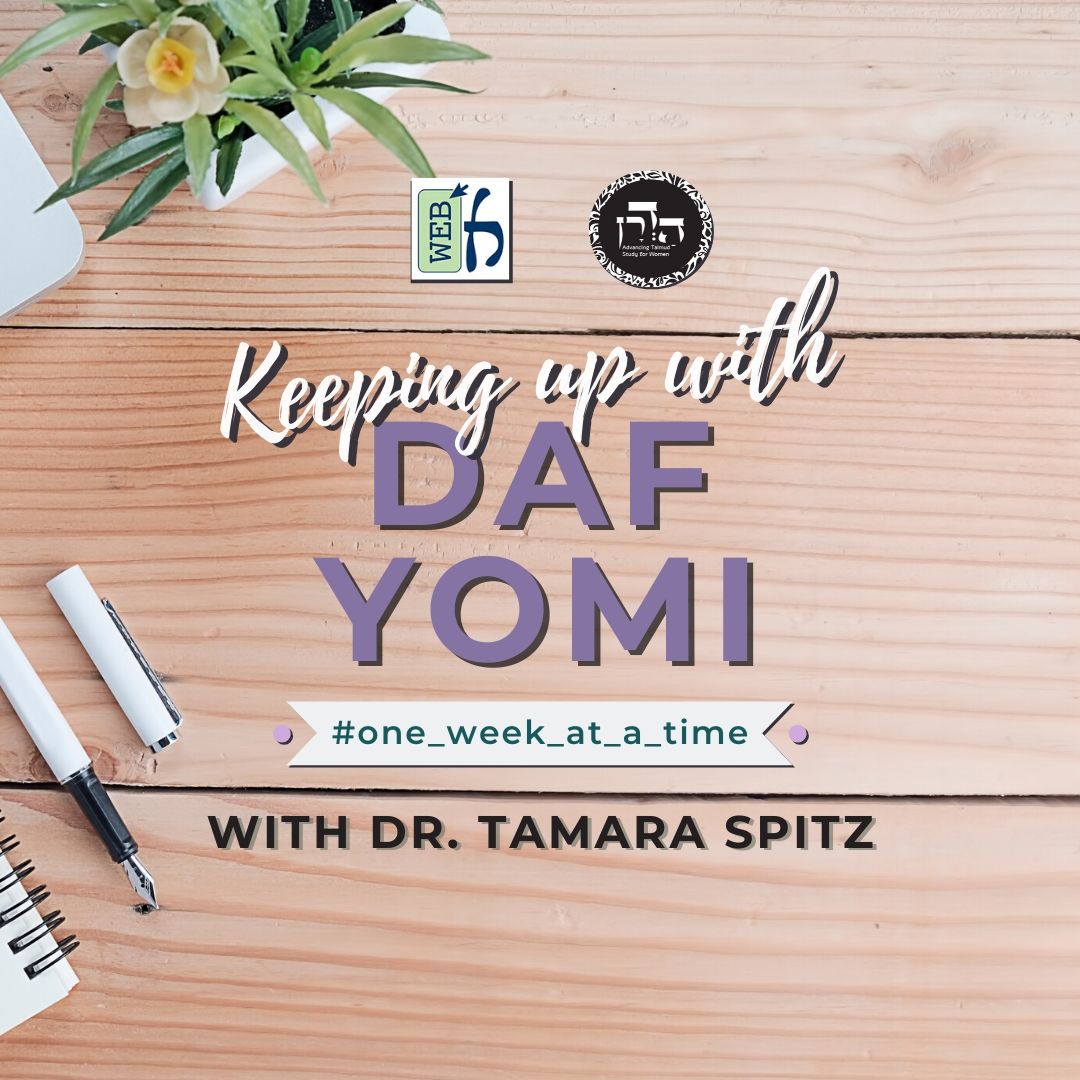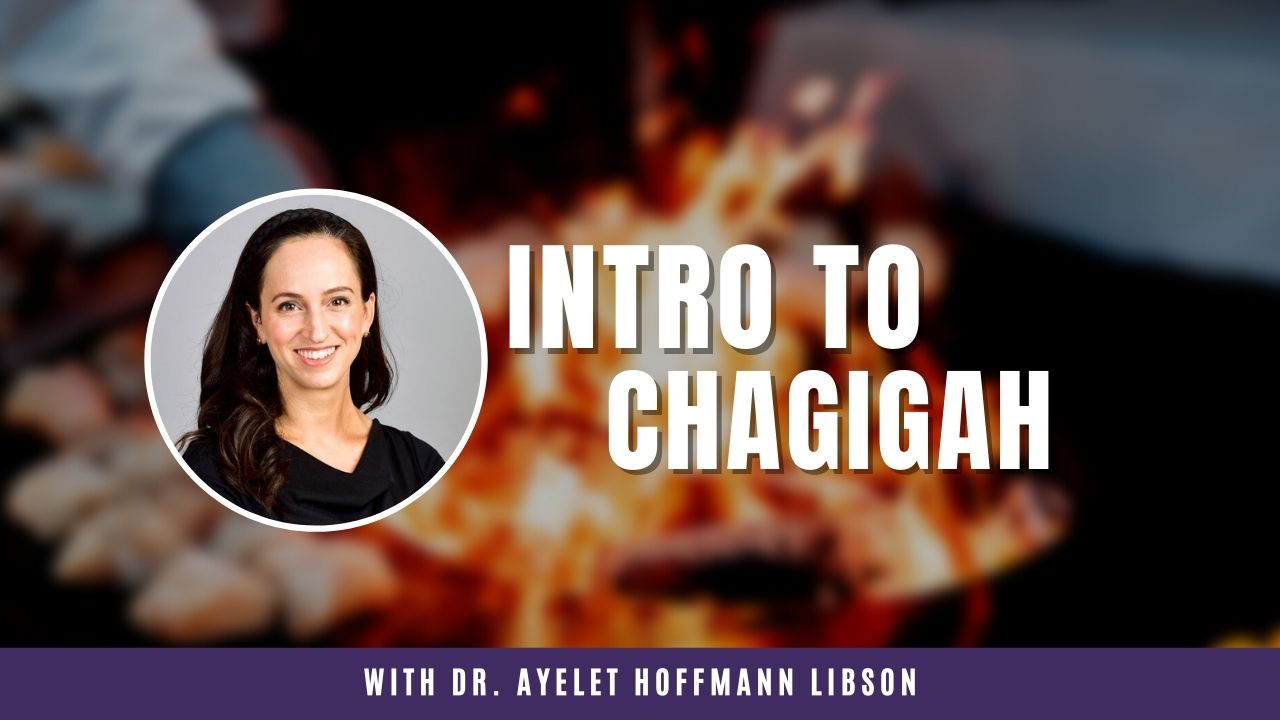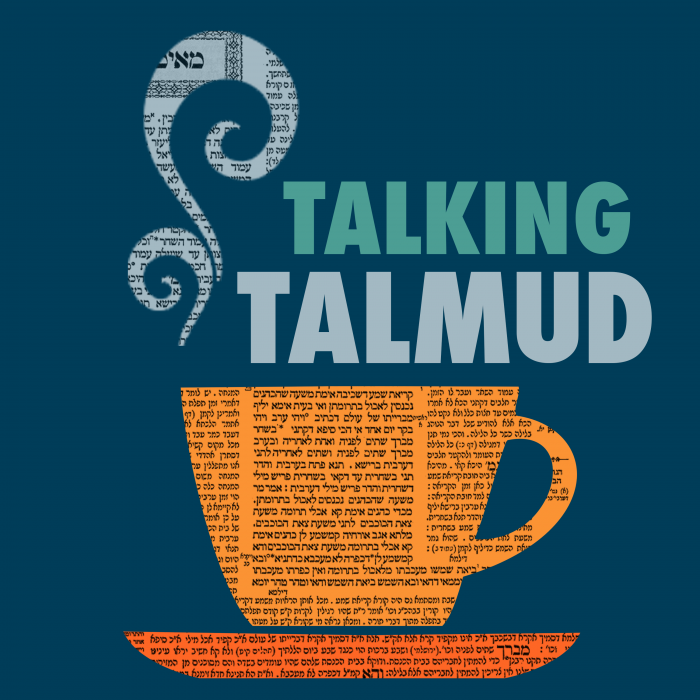Chagigah 2
הַכֹּל חַיָּיבִין בִּרְאִיָּיה, חוּץ מֵחֵרֵשׁ שׁוֹטֶה וְקָטָן, וְטוּמְטוּם וְאַנְדְּרוֹגִינוֹס, וְנָשִׁים, וַעֲבָדִים שֶׁאֵינָם מְשׁוּחְרָרִים, הַחִיגֵּר וְהַסּוֹמֵא, וְהַחוֹלֶה וְהַזָּקֵן, וּמִי שֶׁאֵינוֹ יָכוֹל לַעֲלוֹת בְּרַגְלָיו.
MISHNA: All are obligated on the three pilgrim Festivals in the mitzva of appearance, i.e., to appear in the Temple as well as to sacrifice an offering, except for a deaf-mute, an imbecile, and a minor; and a tumtum, and a hermaphrodite, and women, and slaves who are not emancipated; and the lame, and the blind, and the sick, and the old, and one who is unable to ascend to Jerusalem on his own legs.
אֵיזֶהוּ קָטָן — כֹּל שֶׁאֵינוֹ יָכוֹל לִרְכּוֹב עַל כְּתֵפָיו שֶׁל אָבִיו וְלַעֲלוֹת מִירוּשָׁלַיִם לְהַר הַבַּיִת, דִּבְרֵי בֵּית שַׁמַּאי. וּבֵית הִלֵּל אוֹמְרִים: כֹּל שֶׁאֵינוֹ יָכוֹל לֶאֱחוֹז בְּיָדוֹ שֶׁל אָבִיו וְלַעֲלוֹת מִירוּשָׁלַיִם לְהַר הַבַּיִת, שֶׁנֶּאֱמַר: ״שָׁלֹשׁ רְגָלִים״.
Who has the status of a minor with regard to this halakha? Any child who is unable to ride on his father’s shoulders and ascend from Jerusalem to the Temple Mount; this is the statement of Beit Shammai. And Beit Hillel say: Any child who is unable to hold his father’s hand and ascend on foot from Jerusalem to the Temple Mount, as it is stated: “Three times [regalim]” (Exodus 23:14). Since the term for feet is raglayim, Beit Hillel infer from here that the obligation to ascend involves the use of one’s legs.
בֵּית שַׁמַּאי אוֹמְרִים: הָרְאִיָּיה — שְׁתֵּי כֶסֶף, וְהַחֲגִיגָה — מָעָה כֶּסֶף. וּבֵית הִלֵּל אוֹמְרִים: הָרְאִיָּיה מָעָה כֶּסֶף, וְהַחֲגִיגָה שְׁתֵּי כֶסֶף.
Beit Shammai say: The burnt-offering of appearance brought on a pilgrim Festival must be worth at least two silver coins, and the Festival peace-offering must be worth at least one silver ma’a coin. And Beit Hillel say: The burnt-offering of appearance must be worth at least one silver ma’a and the Festival peace-offering at least two silver coins.
גְּמָ׳ ״הַכֹּל״ לְאֵתוֹיֵי מַאי? לְאֵתוֹיֵי מִי שֶׁחֶצְיוֹ עֶבֶד וְחֶצְיוֹ בֶּן חוֹרִין. וּלְרָבִינָא דְּאָמַר מִי שֶׁחֶצְיוֹ עֶבֶד וְחֶצְיוֹ בֶּן חוֹרִין פָּטוּר מִן הָרְאִיָּיה, ״הַכֹּל״ לְאֵתוֹיֵי מַאי? לְאֵתוֹיֵי חִיגֵּר בְּיוֹם רִאשׁוֹן וְנִתְפַּשֵּׁט בְּיוֹם שֵׁנִי.
GEMARA: The Gemara asks: When the mishna states that all are obligated in the mitzva of appearance in the Temple, the term: All, comes to add what in the mishna’s ruling? The Gemara answers: It serves to add one who is half-slave half-freeman. The Gemara asks: And according to the opinion of Ravina, who said: One who is half-slave half-freeman is exempt from the appearance in the Temple, the term: All, comes to add what? The Gemara answers: It comes to add one who was lame on the first day of the Festival and was unable to travel, and was healed on the second day of the Festival. This man is obligated to appear before the end of the Festival.
הָנִיחָא לְמַאן דְּאָמַר כּוּלָּן תַּשְׁלוּמִין זֶה לָזֶה. אֶלָּא לְמַאן דְּאָמַר כּוּלָּן תַּשְׁלוּמִין דְּרִאשׁוֹן, ״הַכֹּל״ לְאֵתוֹיֵי מַאי? לְאֵתוֹיֵי סוֹמֵא בְּאַחַת מֵעֵינָיו.
The Gemara asks: This works out well according to the one who said that all seven days of the Festival redress one another, i.e., the obligation to appear applies equally on all days of the Festival. Consequently, one who was unable to travel on the first day may do so on the second day. However, according to the one who said that the main obligation is on the first day and all the remaining days merely redress the first day, and therefore one who was exempt from appearing on the first day of the Festival remains exempt throughout the rest of the Festival, the term: All, comes to add what? The Gemara answers: It comes to add one who is blind in one of his eyes.
וּדְלָא כִּי הַאי תַּנָּא, דְּתַנְיָא: יוֹחָנָן בֶּן דַּהֲבַאי אוֹמֵר מִשּׁוּם רַבִּי יְהוּדָה: סוֹמֵא בְּאַחַת מֵעֵינָיו פָּטוּר מִן הָרְאִיָּיה, שֶׁנֶּאֱמַר: ״יִרְאֶה״, ״יֵרָאֶה״ — כְּדֶרֶךְ שֶׁבָּא לִרְאוֹת כָּךְ בָּא לֵירָאוֹת. מָה לִרְאוֹת בִּשְׁתֵּי עֵינָיו, אַף לֵירָאוֹת בִּשְׁתֵּי עֵינָיו.
The Gemara notes: And this is not in accordance with the opinion of this tanna, as it is taught in a baraita that Yoḥanan ben Dehavai says in the name of Rabbi Yehuda: One who is blind in one of his eyes is exempt from the mitzva of appearance, as it is stated: “Three occasions in the year all your males will appear [yera’e] before the Lord God” (Exodus 23:17). Since there are no vowels in the text, this can be read as: All your males will see [yireh] the Lord God. This teaches that in the same manner that one comes to see, so he comes to be seen: Just as the usual way to see is with both one’s eyes, so too the obligation to be seen applies only to one who comes with the sight of both his eyes. Therefore, one who is blind in one eye is not obligated in the mitzva of appearance in the Temple.
וְאִיבָּעֵית אֵימָא: לְעוֹלָם כִּדְאָמְרִי מֵעִיקָּרָא, וּדְקָא קַשְׁיָא לָךְ הָא דְּרָבִינָא — לָא קַשְׁיָא: כָּאן כְּמִשְׁנָה רִאשׁוֹנָה, כָּאן כְּמִשְׁנָה אַחֲרוֹנָה. דִּתְנַן: מִי שֶׁחֶצְיוֹ עֶבֶד וְחֶצְיוֹ בֶּן חוֹרִין — עוֹבֵד אֶת רַבּוֹ יוֹם אֶחָד וְאֶת עַצְמוֹ יוֹם אֶחָד, דִּבְרֵי בֵּית הִלֵּל.
And if you wish, say instead: Actually, it is as we said initially, that it comes to include one who is half-slave and half-freeman. And as for that which poses a difficulty to the opinion of Ravina, it is not difficult: Here it is in accordance with the initial version of the mishna, whereas there, Ravina’s statement, is in accordance with the ultimate version of the mishna. As we learned in a mishna (Pesaḥim 88a): One who is half-slave half-freeman serves his master one day and works for himself one day. This is the statement of Beit Hillel.
אָמְרוּ לָהֶם בֵּית שַׁמַּאי:
Beit Shammai said to them:
תִּקַּנְתֶּם אֶת רַבּוֹ, וְאֶת עַצְמוֹ לֹא תִּקַּנְתֶּם. לִישָּׂא שִׁפְחָה אֵינוֹ יָכוֹל, בַּת חוֹרִין אֵינוֹ יָכוֹל.
You have remedied the situation of his master, who benefits fully from all his rights to the slave, but his own situation you have not remedied. How so? He is unable to marry a maidservant, as half of him is already free, and a free Jew may not marry a Canaanite maidservant. He is likewise unable to marry a free woman, as half of him is still a slave.
לִיבְטֵּיל — וַהֲלֹא לֹא נִבְרָא הָעוֹלָם אֶלָּא לִפְרִיָּה וּרְבִיָּה, שֶׁנֶּאֱמַר: ״לֹא תֹהוּ בְרָאָהּ לָשֶׁבֶת יְצָרָהּ״. אֶלָּא מִפְּנֵי תִּיקּוּן הָעוֹלָם, כּוֹפִין אֶת רַבּוֹ וְעוֹשֶׂה אוֹתוֹ בֶּן חוֹרִין, וְכוֹתֵב לוֹ שְׁטָר עַל חֲצִי דָּמָיו. וְחָזְרוּ בֵּית הִלֵּל לְהוֹרוֹת כְּדִבְרֵי בֵּית שַׁמַּאי.
And if you say he should be idle and not marry, but isn’t it true that the world was created only for procreation, as it is stated: “He did not create it to be a waste; He formed it to be inhabited” (Isaiah 45:18)? Rather, for the betterment of the world we force his master to make him a freeman, and the slave writes a bill to his master accepting his responsibility to pay half his value to him. And Beit Hillel ultimately retracted their opinion, to rule in accordance with the statement of Beit Shammai that a half-slave must be set free.
חוּץ מֵחֵרֵשׁ שׁוֹטֶה וְקָטָן כּוּ׳. קָתָנֵי חֵרֵשׁ דּוּמְיָא דְּשׁוֹטֶה וְקָטָן: מָה שׁוֹטֶה וְקָטָן — דְּלָאו בְּנֵי דֵעָה, אַף חֵרֵשׁ — דְּלָאו בַּר דֵּעָה הוּא. וְקָא מַשְׁמַע לַן כְּדִתְנַן: חֵרֵשׁ שֶׁדִּיבְּרוּ חֲכָמִים בְּכׇל מָקוֹם, שֶׁאֵינוֹ שׁוֹמֵעַ וְאֵינוֹ מְדַבֵּר. הָא מְדַבֵּר וְאֵינוֹ שׁוֹמֵעַ, שׁוֹמֵעַ וְאֵינוֹ מְדַבֵּר — חַיָּיב.
§ The mishna taught: Except for a deaf-mute, an imbecile, and a minor. The Gemara notes: By listing these three cases together the mishna is teaching that a deaf-mute is similar to an imbecile and a minor: Just as an imbecile and a minor are among those who are not of sound mind, so too the deaf-mute [ḥeresh] mentioned here is one who is not of sound mind. And this teaches us as we learned in a mishna (Terumot 1:2): The ḥeresh, whom the Sages discussed everywhere, is one who does not hear and does not speak, and therefore his mind is not lucid. It can be inferred from this that one who speaks but does not hear and one who hears but does not speak are obligated in mitzvot like any other person.
תְּנֵינָא לְהָא, דְּתָנוּ רַבָּנַן: הַמְדַבֵּר וְאֵינוֹ שׁוֹמֵעַ — זֶהוּ חֵרֵשׁ, שׁוֹמֵעַ וְאֵינוֹ מְדַבֵּר — זֶהוּ אִלֵּם, זֶה וָזֶה — הֲרֵי הֵן כְּפִקְחִין לְכׇל דִּבְרֵיהֶם.
The Gemara notes: We already learned this, as the Sages taught in the Tosefta (Terumot 1:2): One who speaks but does not hear, this is a deaf person. One who hears but does not speak, this is a mute. Both this one and that one are in the same legal category as those who can see and hear with regard to all matters. This shows that the ḥeresh exempted by the Sages is one who neither hears nor speaks.
וּמִמַּאי דִּמְדַבֵּר וְאֵינוֹ שׁוֹמֵעַ זֶהוּ חֵרֵשׁ, שׁוֹמֵעַ וְאֵינוֹ מְדַבֵּר זֶהוּ אִלֵּם? דִּכְתִיב: ״וַאֲנִי כְחֵרֵשׁ לֹא אֶשְׁמָע וּכְאִלֵּם לֹא יִפְתַּח פִּיו״. וְאִיבָּעֵית אֵימָא, כִּדְאָמְרִי אִינָשֵׁי: אִישְׁתְּקִיל מִילּוּלֵיהּ.
The Gemara asks: And from where is it derived that one who speaks but does not hear is a deaf person, and one who hears but does not speak is a mute? As it is written: “But I am as a deaf man, I hear not; and I am as a dumb man [illem] who does not open his mouth” (Psalms 38:14). If you wish, say instead that this is as people say: His speech has been taken [Ishtakeil Milulei]; the term illem is an acronym for this phrase.
מְדַבֵּר וְאֵינוֹ שׁוֹמֵעַ, שׁוֹמֵעַ וְאֵינוֹ מְדַבֵּר — חַיָּיב. וְהָתַנְיָא: מְדַבֵּר וְאֵינוֹ שׁוֹמֵעַ, שׁוֹמֵעַ וְאֵינוֹ מְדַבֵּר — פָּטוּר!
The Tosefta taught that one who speaks but does not hear and one who hears but does not speak are obligated in mitzvot. The Gemara asks: Isn’t it taught in a baraita that one who speaks but does not hear and one who hears but does not speak are exempt?
אָמַר רָבִינָא, וְאִיתֵּימָא רָבָא: חַסּוֹרֵי מִיחַסְּרָא וְהָכִי קָתָנֵי: הַכֹּל חַיָּיבִין בִּרְאִיָּיה וּבְשִׂמְחָה, חוּץ מֵחֵרֵשׁ הַמְדַבֵּר וְאֵינוֹ שׁוֹמֵעַ, שׁוֹמֵעַ וְאֵינוֹ מְדַבֵּר, שֶׁפָּטוּר מִן הָרְאִיָּיה. וְאַף עַל פִּי שֶׁפָּטוּר מִן הָרְאִיָּיה, חַיָּיב בְּשִׂמְחָה. וְאֶת שֶׁאֵינוֹ לֹא שׁוֹמֵעַ וְלֹא מְדַבֵּר, וְשׁוֹטֶה וְקָטָן — פָּטוּר אַף מִן הַשִּׂמְחָה, הוֹאִיל וּפְטוּרִים מִכׇּל מִצְוֹת הָאֲמוּרוֹת בַּתּוֹרָה.
Ravina said, and some say it was Rava who said: The mishna is incomplete and is teaching the following: All are obligated in the mitzvot of appearance in the Temple and rejoicing during the pilgrim Festival by eating the sacrificial meat, except for a deaf person who speaks but does not hear and a mute person who hears but does not speak, each of whom is exempt from the mitzva of appearance. And even though he is exempt from the mitzva of appearance, he is obligated in the mitzva of rejoicing. But one who does not hear and does not speak, and an imbecile and a minor, each of these is exempt even from rejoicing, since they are exempt from all the mitzvot mentioned in the Torah, as they are not of sound mind.
תַּנְיָא נָמֵי הָכִי: הַכֹּל חַיָּיבִין בִּרְאִיָּיה וּבְשִׂמְחָה, חוּץ מֵחֵרֵשׁ הַמְדַבֵּר וְאֵינוֹ שׁוֹמֵעַ, שׁוֹמֵעַ וְאֵינוֹ מְדַבֵּר, שֶׁפְּטוּרִין מִן הָרְאִיָּיה. וְאַף עַל פִּי שֶׁפָּטוּר מִן הָרְאִיָּיה —
That opinion is also taught in a baraita: All are obligated in the mitzva of appearance and in rejoicing, except for a deaf person who speaks but does not hear and one who hears but does not speak, as they are exempt from the mitzva of appearance. And even though they are exempt from the mitzva of appearance,


























